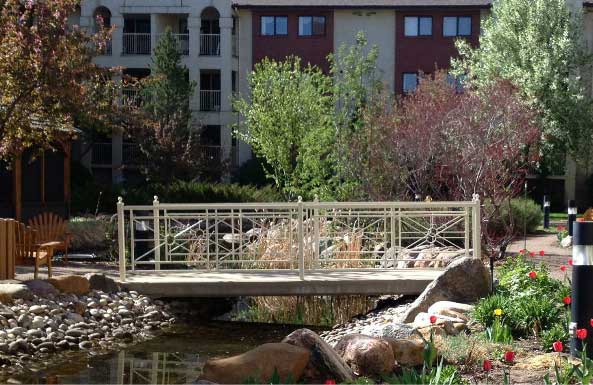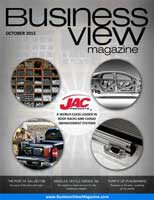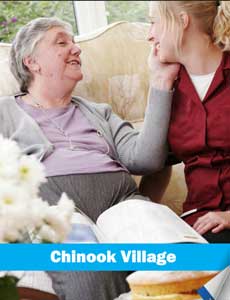A safe and caring home for medicine hat seniors
Chinook Village is a premier, non-profit, retirement community in Medicine Hat, Alberta. The Village has a senior population of over 420 residents, who live in 343 units, in the five buildings that comprise its half-million-square-foot campus, nestled in the southeastern part of the province. Chinook Village was built on land that formerly housed Hillcrest Christian College, a school that vacated the premises and moved from Medicine Hat, over twenty years ago.
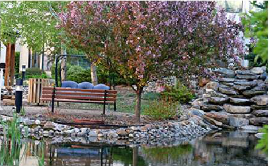 According to Vern Enslen, Chinook Village’s Operations Manager, the local Evangelical Missionary Church owned title to the land. “A few members of the church had a vision for a seniors complex. So they formed a Board and took over the property and developed a plan to have independent-living seniors who are completely on their own, as well as have some supported-living suites.
According to Vern Enslen, Chinook Village’s Operations Manager, the local Evangelical Missionary Church owned title to the land. “A few members of the church had a vision for a seniors complex. So they formed a Board and took over the property and developed a plan to have independent-living seniors who are completely on their own, as well as have some supported-living suites.
“The first units were built in 1991,” he continues. “The only school property that was left at the time were two dorms and those were both torn down, as well as some administrative offices and classrooms and those are all gone now. Everything is brand new, other than what we call the Terrace Room, which used to be the gymnasium, and the food services area. So that has all been renovated.”
Gary Sawatzky, Chinook’s Managing Director, talks about the founders’ all-important business model: “The vision here was to create [a seniors facility] that would be one that was relatively easy to get into – not low income, but lower pricing compared to the marketplace – so that seniors would be able to afford to move into Chinook. So Chinook is, for the most part, a life lease type of facility.”
A life lease is a legal agreement that permits purchasers to occupy a home for life (or until they are no longer capable of living there) in exchange for an initial lump sum payment and subsequent monthly payments to cover the ongoing project management fees, and maintenance and operating expenses. “A life-lease is deemed to be, by definition, a rental contract in format,” explains Sawatzky. “You pay money upfront – you don’t have to pay rent while you’re there because you’ve purchased the unit, but you get most of your money back at the end.” Of course, Chinook Village residents may also choose to pay a monthly rental fee, in lieu of life lease, or even combine the best of both options to suit their financial needs. But the Village gets no government funding. “The facility is 100 percent, privately supported by the residents,” says Sawatzky.
Chinook Village is divided into supportive living areas and an independent side. Peggy Kerr, the Nurse Manager, breaks down the numbers: “In the congregate area, which is Supportive Living (SL) Level One, we have 103 residents in 94 suites. In Supportive Living Level Two, we have 69 suites and, currently, 57 residents.” SL One residents are those who still want to live independently, but might want or require some occasional assistance with meals, laundry, housekeeping, etc. Residents who need a higher level of services, including medical monitoring on a regular basis and on-site nursing, can live in an Assisted Living suite with 24-hour support. All supportive living options, such as personal care, specialized medical services, supervision and assistance with daily living needs, etc., can be tailored to suit a resident’s health needs as well as his or her financial requirements.
On Chinook’s independent side, there are 180 suites which house 260 residents who do not receive care of any kind. These units are for healthy, independent seniors who simply want to take advantage of condominium-style living without having to worry about managing their properties. They can come and go as they please, while taking advantage of the Village’s recreational activities and physical amenities which includes a 40,000 square-foot, private park in the heart of the campus. They can also avail themselves of housekeeping and meal services for an extra fee.
Sawatzky notes that Chinook finished its last building in 2002, and since then there have been no significant physical additions to the property, although there have been ongoing discussions with a commercial building across the street from the Village to build a skywalk between them, which would allow for safer access for the residents. “That would be a brand new type of venture for Medicine Hat,” he drolly suggests. “There are no other skywalks, here.”
At present, though, potential skywalks notwithstanding, Chinook Village is more concerned with mapping out its operational future rather than its physical one. Sawatzky explains: “Chinook is at a very unique place, right now. It’s been around for 23 years, and it’s got a very established reputation as being a fantastic facility. But our physical growth has stopped in the last twelve years. Now, we’re looking at what’s next. Are we going to just maintain or are we going to grow? Are we going to grow differently? We’re just getting into these discussions.
“Chinook’s initial vision was to 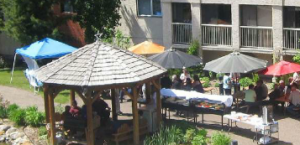 provide care right through dementia,” he says. (Dementia care is classified as SL Level Four. The upgrade would put the facility into a category that must meet certain government regulations in return for public funding.) “I don’t think we’ve lost sight of that; it’s just a matter of how that works in today’s marketplace with so much demand on government funding. And how does that work in relation to our current facility? Is that where we need to go; is there continued demand for it? So as we do our strategic planning, we have to continue to look at: How do we continue to meet the needs of our residents; how far can we continue to move up the supportive living stream; and at what point do we need to intersect with the government so that its requirements are being met?”
provide care right through dementia,” he says. (Dementia care is classified as SL Level Four. The upgrade would put the facility into a category that must meet certain government regulations in return for public funding.) “I don’t think we’ve lost sight of that; it’s just a matter of how that works in today’s marketplace with so much demand on government funding. And how does that work in relation to our current facility? Is that where we need to go; is there continued demand for it? So as we do our strategic planning, we have to continue to look at: How do we continue to meet the needs of our residents; how far can we continue to move up the supportive living stream; and at what point do we need to intersect with the government so that its requirements are being met?”
While pondering Chinook’s long-term plans, Sawatzky reveals some other potential short-term changes to Chinook: “We have plans for this fall to begin an adult-day program, which would reach out into the community. That’s a new development for us and we’re looking forward to that; it will be quite exciting,” he exclaims. “And we’ve begun doing the research and the background work for bringing in a child day-care program that would work within our facility. One, to meet the needs of where our workers are going to be in the next few years, and also to be involved with the community a bit more. But the third aspect, which is even more exciting is: what does it mean to seniors to be around children? We’ve got a team working on this, right now, and we’re excited about what this can mean for us.”
When asked what differentiates Chinook Village from other seniors communities, all three administrators have something to contribute. Enslen: “I think the life-lease is one of the key advantages we have, and that is because when the senior comes in, they’re not bombarded with needing to talk to a lawyer or a realtor. We have the life-lease program; everything is straight-forward. The resident doesn’t have to do a lot, other than write the check, either for the rent or for the life-lease. And when they leave, they don’t have to worry about trying to market their suite, trying to sell their suite, worried about getting their money back – that all takes care of itself. We look after that for them. They just get a check at the end if they’re a life-lease holder, or if they’re renting , of course, the rent is terminated. So it makes life so much easier and simpler for them.”
Sawatzky: “The selling points at Chinook are the care we take for the residents right from walking in the door. We give them free meal tickets because we want them to try the meals here. We have a tremendous reputation in the community for our kitchen and our cooks and the type of food that they put out. We have a full-time Recreation Therapist, a Registered Nurse, Licensed Nurse Practitioners, healthcare aides – we want to take care of the residents and look after them in all capacities. Caring and taking time is really important.” Sawatzky is also quick to point out the benefits of Chinook Village’s prime locale: “Medicine Hat is actually one of the warmest and sunniest places in Western Canada. For seniors, that’s a huge attraction. We attract from two different provinces – Saskatchewan and Alberta – because of our location. Sometimes the waiting list has been as long as two years to get into Chinook.”
Kerr: “It takes special people to work with seniors . We have a core group of Licensed Practical Nurses, who are professionally trained; they’re very committed to our residents. We hear that every day from families and the residents. I think they are one of our biggest assets. I like the way they treat our residents. We also have a very good recreation department and activities for the residents on a daily basis. And we have our own chaplain, here.”
Sawatzky also emphasizes the value of the Village’s 100-member staff: “As people come into our facility, they say ‘This is the friendliest staff to work with!’ And many people on staff say that this is like being part of a family. When you have that kind of approach from your staff, it rubs off on how you treat residents and how the residents feel about being here. We work where they live and they live where we work. There’s open communication and good rapport among people. It really does go a long way towards setting us apart as a facility.”
As Chinook Village contemplates its future, it can be confident that its 20-plus years of resident-focused care and concern, combined with its exquisite amenities and varied menu of leisure activities, has already ensured its reputation as one of Alberta’s finest and most successful over-50, senior communities.
AT A GLANCE
WHO: Chinook Village
WHAT: A non-profit, retirement community
WHERE: Medicine Hat, Alberta, Canada
WEBSITE: www.chinookvillage.com
